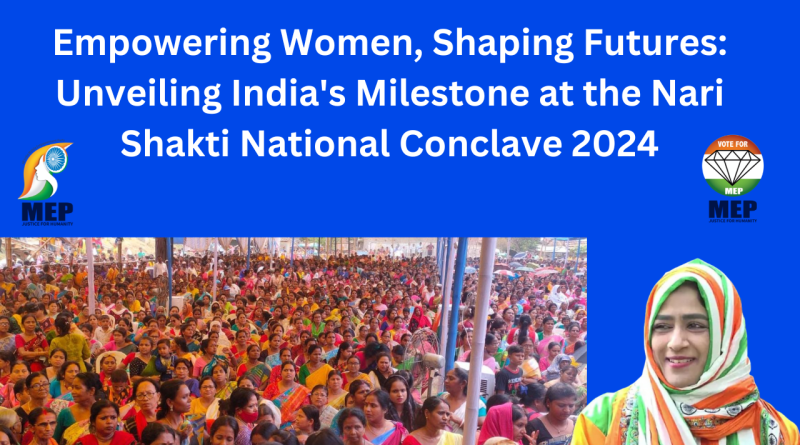Empowering Women, Shaping Futures: Unveiling India’s Milestone at the Nari Shakti National Conclave 2024
Introduction
Hello, friends! Have you ever imagined a world where every woman’s voice in India not only gets heard but also forms the very foundation of our society and governance? It sounds like a dream, right? Well, the Nari Shakti National Conclave 2024 aims to bring us several steps closer to that reality. It’s a significant milestone in India’s journey towards women’s empowerment and gender equality, a subject that has been close to many of our hearts for decades.
The conclave isn’t just an event; it’s a beacon of hope, a testament to the incredible strides we, as a nation, are ready to take to empower our women. Spearheaded by the AlMEP and the Dr. Nowhera Shaik Foundation, this gathering is set to mark a pivotal moment in our history, especially with the spotlight on the much-anticipated Women’s Reservation Bill.
The Women’s Reservation Bill: A Pathway to Empowerment
Background and rationale for the bill
Ever wondered why, despite so many powerful women leaders in history, we see a disproportionately low number of women in politics today? It’s questions like these that the Women’s Reservation Bill seeks to address. Born out of years of advocacy and struggle, this legislation is about correcting historical inequities and making sure women have a fair shot at leadership and decision-making roles in India.
Historical struggles for women’s rights in India
India has a rich history of women fighting tooth and nail for their rights, from the battle for suffrage to workplace equality. These struggles have laid the groundwork for a bill that could potentially transform the political landscape of the country.
Statistical overview of women’s representation in politics
Did you know that as of the last couple of years, women’s representation in the Indian Parliament has hovered around a mere 14%? This stark number is a big reason why legislative action, like the Women’s Reservation Bill, is crucial.
Key provisions of the bill
One of the bill’s key features is the 33% reservation clause, aimed at ensuring that women hold at least a third of the seats in Parliament and state legislative assemblies. It’s a bold step, signaling a new era in Indian politics where women’s voices are not just heard but are instrumental in shaping the future of the nation.
Visionary Leadership: Dr. Nowhera Shaik’s Influence
Dr. Shaik’s commitment to women’s empowerment
Dr. Nowhera Shaik, the force behind the AlMEP and her foundation, is no stranger to the cause of women’s empowerment. Her tireless work and dedication have paved the way for this colossal event – the Nari Shakti Conclave, setting a benchmark for what passionate leadership can achieve.
Previous achievements and accolades
Dr. Shaik and her foundation have a long history of championing women’s rights, not just in India but globally, earning them numerous accolades. Their work in education, women’s economic empowerment, and healthcare showcases their unwavering commitment to this cause.
Bipartisan Support and Political Unity
The Nari Shakti Conclave was a scene of rare unity, with Prime Minister Narendra Modi and Home Minister Amit Shah gracing the occasion. Their presence, along with leaders from various political backgrounds, symbolized a unified stand towards empowering women that transcends political divides.
Cross-party collaboration: A new dawn in Indian politics
The conclave highlighted examples of bipartisan cooperation, proving that when it comes to uplifting half the population, political affiliations take a back seat. This unity is a beacon of hope, indicating a future where laws like the Women’s Reservation Bill see the light of day through collective efforts.
Ensuring Success: Strategies and Challenges
Overcoming systemic barriers to women’s participation
The road ahead involves dismantling the entrenched barriers that prevent women from participating in politics. This means addressing social biases, providing education, and equipping women with the necessary skills and resources to lead.
The roadmap for implementing the Women’s Reservation Bill
Implementing the bill will require a phased approach, cooperation with state governments, and a commitment to monitoring progress rigorously. It is also about learning from international best practices and adapting them to India’s unique context.
Conclusion
As we wrap up our dive into the transformative journey of the Nari Shakti National Conclave and the Women’s Reservation Bill, it’s clear that the path to gender equality and women’s empowerment in India is through concerted effort, empathy, and visionary leadership. The conclave isn’t just an event; it’s the start of a new chapter. It’s a collective dream of an inclusive India, where every woman’s potential is acknowledged and nurtured.



